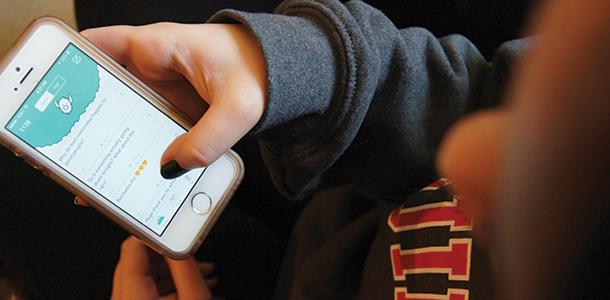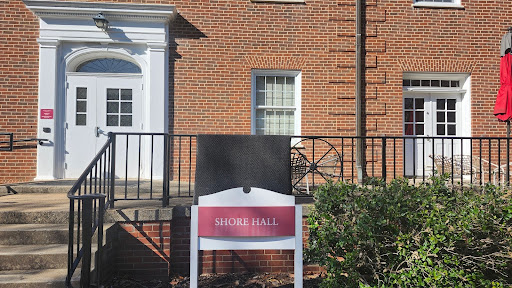Yik Yak offers dangerous anonymity
A student looks at Yik Yak on their phone. The app has caused controversy for its anonymous posts.
Like Facebook 10 years ago, Yik Yak has taken the campus social media scene by storm.
Yik Yak allows students to post anonymously about anything that comes to mind, and while most of these anonymous ‘Yaks’ may appear harmless, many of them are not.
Shortly after release in 2013, Yik Yak became the “go-to social feed for college students” on over 1,000 college campuses, according to The New York Times. Indeed Yik Yak has spread like wildfire, but has left many campuses smoldering in its wake.
“I believe that it is detrimental to allow an anonymous space that tolerates degrading comments about other people,” said junior Molly Anne Marcotte, president of Community Senate. “If you don’t know who is being verbally violent towards you, then you end up operating entirely in fear, and question who are your real friends and who are not.”
The Sexual Assault Awareness Support and Advocacy group has already organized a specific subcommittee investigating the app’s effect on the Guilford community.
“It’s a thin line of saying, ‘It’s just a social media app,’ and then seeing the real repercussions of people hurting,” said senior Ines Sanchez de Lozada, chair of the subcommittee.
Take for example the recent Yak trend of malicious comments between Guilford’s athletes and non-athletes. Without the fear of being caught, these Yik Yak users have sacrificed Guilford’s core values of integrity, community and equality.
“Some might have entered the (athlete/non-athlete) discussion feeling neutral towards the issue, but as they became more involved in the conversation, they may have drifted to one of the extremes,” said Associate Professor of Psychology Eva Lawrence. “Being polarized in this sense may truly divide the community in a way that is not healthy.”
Campuses across the country have seen worse Yak attacks. Yik Yak users have blatantly bullied individuals, carried out racial attacks and even posted bomb threats and threats of mass shootings.
“The reason why the app is so distressing is because of its anonymous format,” said Hollins University senior Jenna Gant. “There is no accountability. No faces can be placed to the hate, only speculation.”
According to Gant, Yik Yak exacerbated a great deal of the racial tension that was brewing at Hollins last fall. Gant had played an active part in the Black Lives Matter campaign on campus and was appalled at some of the hateful anti-Black and anti-Semitic comments shared on the app’s forum.
“There was a lot of fear on campus because that violent, racist speech could come from anyone; your roommate, classmate or your friend at the lunch table,” Gant said.
Users who post hateful speech do not have to face the consequences of what they say.
“(The app) doesn’t hold people accountable for their statements, which can be problematic at times like these,” said Binford Community Director and Student Success Mentor Brian Daniel ‘11.
While the overall removal of the app from downloadable sites will be near to impossible, students need to become aware of the potentially harm that thoughtless comments can generate.
“Learning to be true to your integrity while posting in a supposedly anonymous forum is a challenge that I hope all students at Guilford will embrace,” said Vice President for Student Affairs and Dean of Students Todd Clark. “The Guilford I know is much better than some of the sexist, biased, egotistical and just plain rude things that I’ve read there.”
Yik Yak is probably here to stay, but Guilford students do have the ability to use the app to build community rather than tear it down. So if you are going to Yak, say something positive, for what you say has the potential to ripple out farther than you could possibly imagine.











richard amstutz • Oct 23, 2015 at 1:55 pm
Nice article on a subject I knew very little about and its potential for disrupting communities.